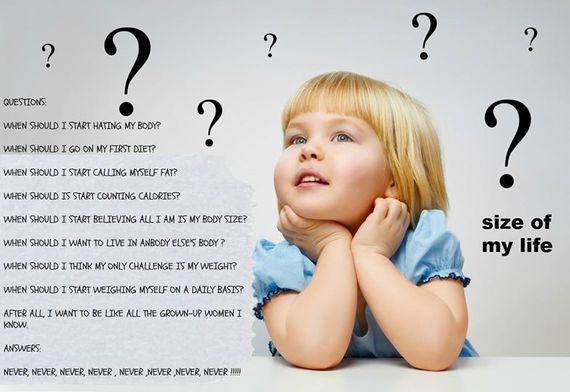
When my daughter Alexa was 4 years old, she asked me the following question: "Mommy, am I fat?" She was not fat then, and she is not fat now, at 9-and-a-half years old. However, whether or not she was or is fat is not the point. I was stunned. After all, how could this be happening? How was it possible that after years of learning to love and accept my body, and believing I was a living role model of that for my daughter, she was asking about being "fat"? I had given up "fat talk," meaning calling myself fat or talking about myself or others being fat, years before she was born. Was my example of loving my body and accepting that people come in all shapes and sizes falling short?
In fact, not only was I stunned, I was angry. I wanted to know: Who was talking about "fat" in front of my 4-year-old daughter? She told me her friends in preschool were talking about being fat! Then it hit me, like a ton of bricks: No matter how much I taught my daughter about loving her body, and seeing it as a friend she would go through life with (that is, unless someday technology comes up with a way for us to move out of one body and into another), there would always be children who were being taught that the most important thing about their bodies was that they were thin. Being thin at any cost has been the mantra of many people, even when the cost has been the high price of an eating disorder. After all, you can never be thin enough, right? Actually, wrong, when the way you stay thin is through self-destructive and dangerous behaviors. All of this caused me to wonder: What questions are we teaching our children to ask about their bodies?
In an ideal world, television, movies, magazines and the Internet would be teaching them that their bodies are the precious homes of their minds and spirits, which move them through their world -- as well as teaching them that their bodies carry them through the thick and thin of their lives. In an ideal world, teachers would be teaching our children that their bodies are more than ornamental. That their bodies are powerful -- can run, jump, dance, play sport,s swim, and they should be thankful for and appreciative of their bodies' strength. They would learn the following about their bodies: that legs are for standing up for ourselves in every situation; stomachs are the core and center of our bodies, where we get gut feelings and intuition from; arms are for hugging; and hands are for writing, drawing, playing musical instruments, cooking and creating our world.
Of course, this is not an ideal world, and we cannot rely on anyone else to teach our children to value their bodies and/or to teach our children to ask themselves questions that promote valuing their bodies. It is up to us individually and collectively, as a society, to teach our children to ask the right questions. Surely, we do not want to set them on the path to hating their bodies, by teaching them to ask: "What is wrong with my body?", "Why is she/he thinner than me?", "How thin do I need to be to stop hating my body?", "Why can't I stay on a diet?", "Why are my thighs, stomach and butt so fat?", "How fast can I lose weight if I starve myself?" etc.
Instead, let's teach them to ask the following questions: "What is my body strong enough to do, or to work toward doing?", "What activity makes me feel energized and happy to be moving?", "Am I eating nutritious food which will energize me and my body?", "When I am eating, am I making sure I am physically hungry and avoiding eating out of boredom, stress, or because of uncomfortable feelings?", "Do I realize my body is unique to me, my life experiences, my eating and exercise habits -- that I can only have my body (even if it is healthier)?", and "Am I being kind and loving to myself and my body?"
When we teach our children to ask questions about loving and caring for themselves and their bodies, we are changing the way they think and feel about their bodies. We are giving them permission to not sign up for the war we have all been waging with our bodies. We are giving them permission to move into their bodies, own them and make peace with them. Lastly, we are allowing them to know that they are so much more than the size of their bodies -- that they are the size of their lives. Have a large sized day and a large sized life!
